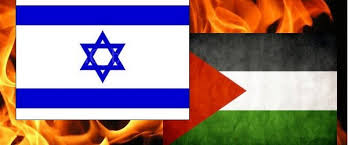One cannot help but be heartbroken by the news from the Middle East. The violence seems so senseless from this distance. And while I have been more exposed to the plight of the Palestinians, and have good friends in Israel who are actively seeking to change the hearts and minds of Israelis and with them the policies of the Israeli government, I have recently come across a couple of accounts of the perspective of Israeli Jews who speak eloquently about what it is like to live in such close proximity to those who are committed to your destruction.
So I wrote a couple of short paragraphs on my Facebook wall about something the devout Muslims in the Arab states short surrounding Israel could do that would be a non-violent response to the conflict. They could assure their Jewish brothers and sisters that, in keeping with the teachings of the Koran and the spirit of the Prophet Mohammed, peace be upon him, that they support the right of Israel to exist and for its citizens of whatever faith to live in peace. Indeed there are a great many Muslims who hold to just such a position.
It was not my intention to choose sides. I was just pointing out that the otherwise non-violent tactics of public demonstrations and calls for divestiture against Israeli action against Palestine don’t acknowledge what Muslim Arabs all around the state of Israel are doing that create the tension. There are some fundamental problems here that can be easily seen if not easily addressed.
From the perspective of Just Conflict, the first best thing we can do to address persistent conflict in significant relationships is to stop doing what creates the problem. There are a good many things we routinely do that move us away from what we need. Most of them are things we do because in some way our society has taught us that this is what one should do. First among them is that we are told by sports, politics, and what passes for our justice system that we can create what we need by making others lose.
Of course this never works and we know it. If I have a conflict with you and I do something to address it which makes you fear that I am trying to make you lose, you will respond by trying to make me lose. So I will try to make you lose. And so we both lose. But no one gets what they need, with the possible exception of the team owners, the party leaders, and the lawyers.
What the Muslim Arabs that surround Israel are doing that constructs the tension is that they hold as their fundamental political goal the eradication of the State of Israel. However understandable this may be in the light of the oppression they have experienced, it is the central thing that Israelis point to as the justification, no, the necessity of their violence.
We know that we cannot make others change…we cannot cause them to choose what we want them to choose. Nevertheless, this knowledge does not stop us from trying to change them. And for our efforts we get feelings of frustration. We become helpless and hopeless.
If instead we ask if there is anything about the current situation that is so troubling to us that we are willing to change ourselves, then we begin to discover a new way of being that allows for genuine transformation.
This is not just something the Palestinians can do. The Israelis can see that their insistence that they have a right to build settlements on disputed land is tantamount to saying that Palestine doesn’t have a right to exist as a sovereign state. They are taking what they see as Arab bad behavior and using it to give them the right to behave badly. Each makes choices to cause the other to lose.
I am not denying anyone’s right to defend themselves. I am saying that doing what causes the other to lose, or even to fear losing, makes us lose.
When instead we act in our own interests to create what we genuinely need, we will necessarily also be acting in ways that create what the other needs. But when we are so hurt and scared and angry that we can only focus on the destruction of the other, then everyone loses.
